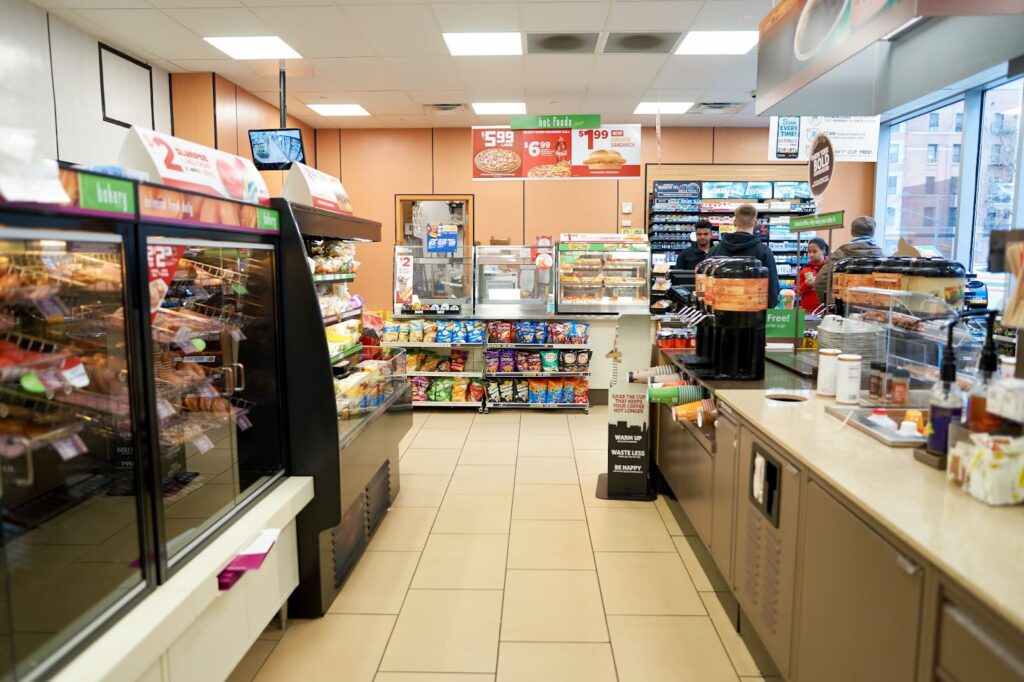In Toronto, there is unbelievable in the residential sector. Supply has fallen to all-time lows and homes remain on the market for mere days before selling – and usually above asking.
With the market being so difficult to get into, some people have begun looking into in Toronto real estate. In particular, there are many opportunities in the space of commercial real estate. This segment has experienced due to the rise of e-commerce and pandemic-related restrictions, however, the need for in-person shopping is far from gone.
Luckily, in a high-density residential area like Toronto, commercial spaces can benefit a lot from high foot traffic and a large number of local shoppers. While specialty goods may be the hardest hit by difficulties in retail, one area that has not been so badly hit is stores selling grocery items and everyday necessities.
Now, the average investor probably isn’t going to buy a supermarket, but some people have been looking into opportunities in owning convenience stores or corner stores. In the City of Toronto, there are convenience stores wherever you look – and for good reason. These stores offer quick and convenient shopping for everyday items, both for locals and for those just passing through. Owning a convenience store can be a viable option as a real estate investment.
So, is it a good strategy to own a convenience store in Toronto? How much money can you make?
Let’s take a look at what you can expect.
Renting vs. buying
There are two main ways that these sorts of stores operate. The first is to operate the store and rent the space from a landlord. This will allow you to easily begin operating, but you will still have a large monthly overhead without benefiting from the equity of your property.
The other option that is much more appealing to investors would be to buy a commercial space and operate the store from there or rent to a store owner. This allows you to hold the property while also generating revenue from the storefront. There are also many mixed-use buildings that have retail space on the ground floor with residential units above. This can offer you additional cash flow through increased rental income. Other options like owning a franchise gas station can be profitable but will require more work to set up and maintain.

Operating a convenience store
If you are a real estate investor, getting into the world of retail business with a convenience store will be quite a large task and will require many new skills. For example, you will need to learn about working with suppliers, handling business licensing and accounting, regulations around tobacco and lottery, food handling, and more. If this new skill set and the ability to be your own boss interests you, then go for it! But there are also other options available.
The most simple way to utilize a property of this type would be to own the building and rent out the store space to a business owner. This allows you to collect rent on the space without requiring you to run the retail store yourself. In fact, if you buy a property that contains an established convenience store, the work will mostly be done for you. However, with this approach, you will be collecting a fixed income and will not benefit directly from the business’s performance.
The other option would be to run the store yourself but hire employees to handle the day-to-day tasks. Again, this will require a different set of skills as you need to know about running a business and managing employee payroll. You will not earn rental income and you will have to pay your employees, but you will also see direct revenue from the sales made in the store. This can provide a lot of options for expanding your business and trying out new ways to bring in customers and more money.
Ultimately, the monthly income on a business once you factor in all of your expenses may be tight, especially if you don’t have the expertise to run it properly. So, for an investor, it may be worth your time to rent out the space instead.
Are convenience stores profitable?
The number of convenience stores you see when out and about should be a clear indicator that these sorts of businesses are making money. However, as with any investment, the amount of money you can earn by owning a convenience store can vary greatly.
First of all, as a real estate asset, you will always need to do your due diligence in researching the area and the local real estate market. Especially with retail space, you will need to consider what additional costs will be required for your investment such as for equipment, nearby competing businesses, and local demand for your products.
Ultimately, as an investor, you may not be as concerned with the actual store’s profits, but rather the property’s value and cash flow. If you choose to rent the space, you can easily choose to charge as much rent to cover the carrying costs and net you a profit. And, given the hot market in the city, you could potentially make big equity gains in future years.
How much money do you need to start?
Generally, since commercial space varies greatly in size and features, the prices of retail spaces are measured in a dollar value per square foot. In most cases, the larger the space, the lower the square footage, so something like a warehouse does not cost the same per foot as a smaller store. Unfortunately, this means you’ll be paying more per square foot since convenience stores tend to be on the smaller side.
According to the Toronto Regional Real Estate Board, the average price per square foot of retail space in Toronto for Q4 2021 was $680.11.
This price will vary across the city. In the east of the city, the average cost was $377.57, in central Toronto, the average was $453.27, and in Toronto west, the cost per square foot was a substantial $1055.49 – the most expensive in the region.
This means that if you purchased a property in central Toronto of about 3,000 square feet, plenty of space for a convenience store, it would cost you about $1,350,000.
Buying a property for a business is similar to buying a home. Essentially, you will not need to pay for the entire space up front, though you will need to provide a down payment for your mortgage. Unlike a residential mortgage, a commercial mortgage has a bit more flexibility. For example, your down payment can go lower than 5% given the right conditions and if your lender agrees to it. It can help to have a specific property in mind as your lender can take the profitability of your space into account when approving you for a mortgage and determining your terms.

Is it a good investment?
In general, real estate in the City of Toronto is a good investment as the city has a very strong market that shows consistent growth. For retail real estate, though the segment has faced some difficulty, the City of Toronto has fared better than other areas and a convenience store is much more likely to remain as an in-demand shop type as opposed to other stores that face more competition from online shopping. It may be an even better investment to purchase a building that includes residential space as you can collect on multiple cash flows from both retail and residential tenants.
You should be aware, however, that investing in commercial real estate also comes with its own differences and things to know. Though you can get into this field with a bit of research, you will be taking on a very different sort of investment than a residential unit, so keep this in mind before you consider making a purchase.
Corben joined CREW as a relative newcomer to the field of real estate and has since immersed himself and learned from the experts about everything there is to know on the topic. As a writer with CREW, Corben produces informative guides that answer the questions you need to know and reports on real estate and investment news developments across Canada. Corben lives in Guelph, Ontario with his partner and their two cats. Outside of work, he loves to cook, play music, and work on all kinds of creative projects. You can contact Corben at corben@crewmedia.ca or find him on Linkedin at https://www.linkedin.com/in/corbengrant/.









